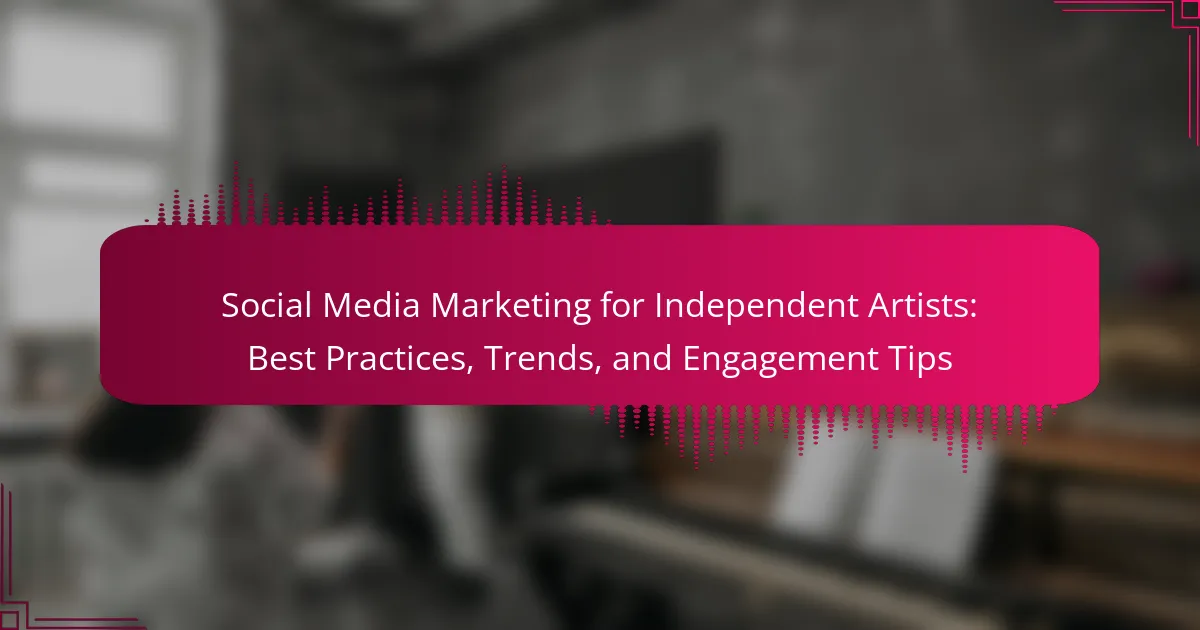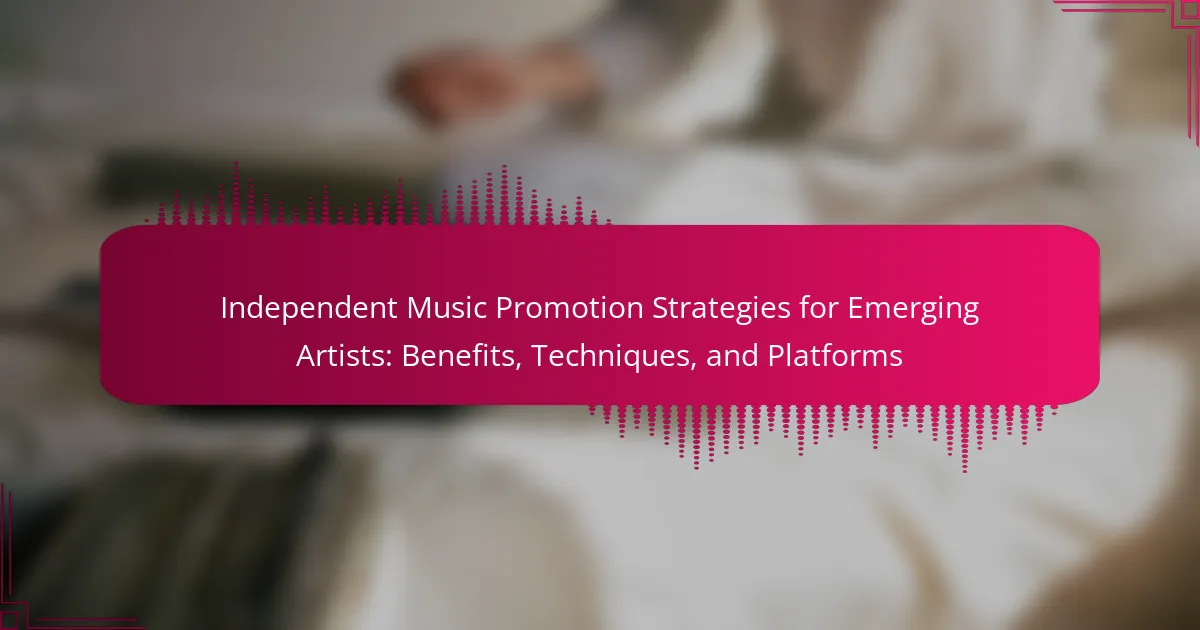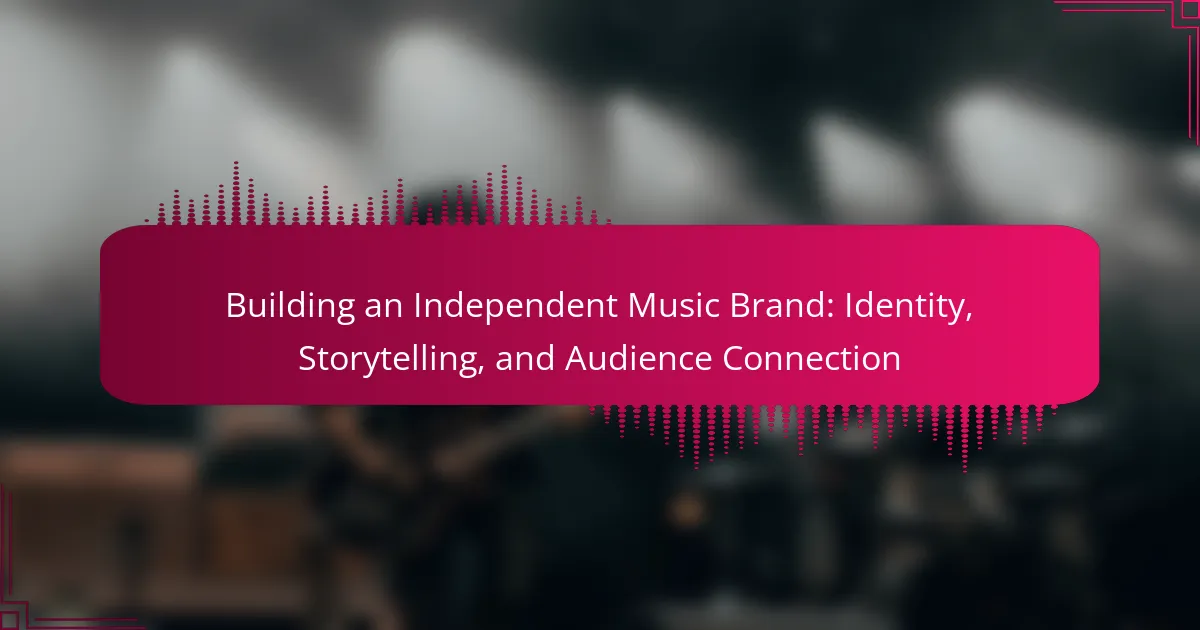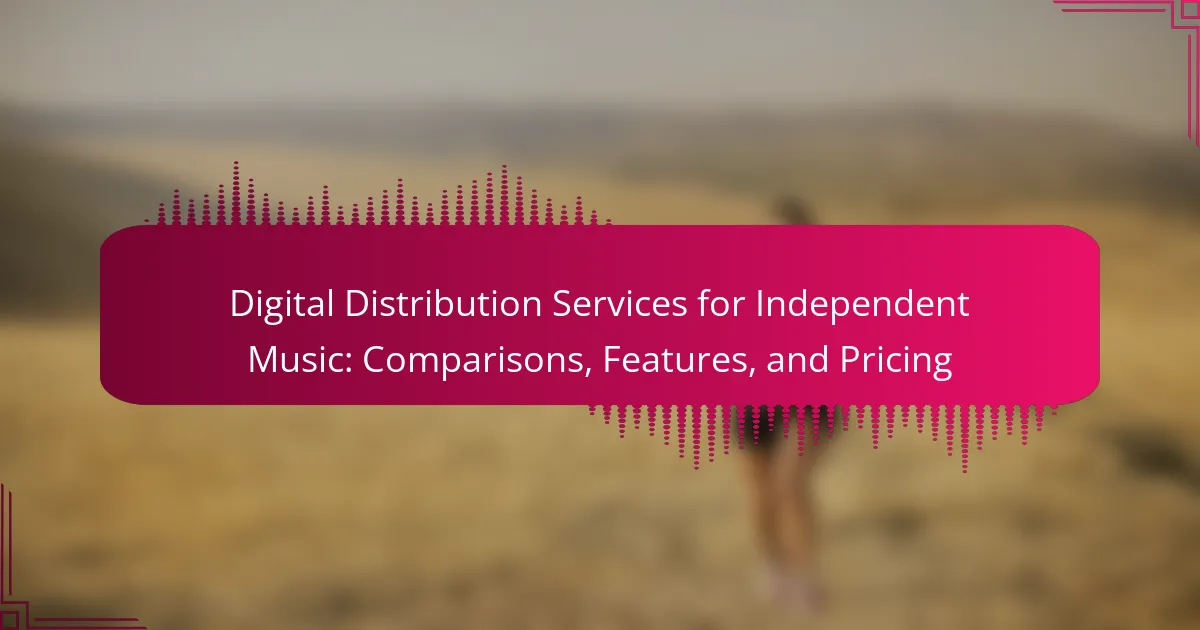Independent musicians often struggle with networking due to limited resources and visibility. Effective strategies include attending industry events, collaborating with fellow artists, and engaging in online communities. These approaches enhance visibility, foster relationships, and create opportunities for growth. By leveraging these methods, musicians can expand their networks and reach in the competitive music industry.
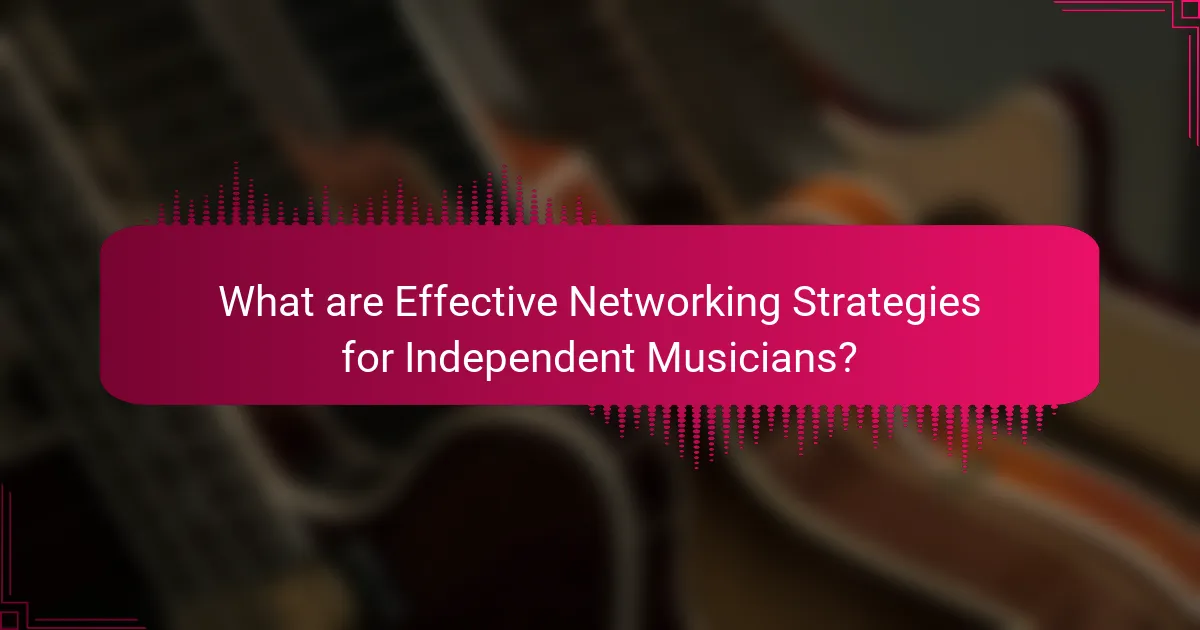
What are Effective Networking Strategies for Independent Musicians?
Effective networking strategies for independent musicians include attending industry events, collaborating with other artists, and engaging in online communities. These approaches foster relationships and enhance visibility.
Attending live music events, showcases, and conferences allows musicians to connect with industry professionals and peers. Collaborations can lead to shared audiences and creative growth. Online communities, such as social media groups or music forums, provide platforms for interaction and support.
Utilising these strategies can significantly expand a musician’s network and opportunities in the industry.
How do Networking Events Enhance Music Careers?
Networking events significantly enhance music careers by facilitating connections, collaborations, and exposure. These gatherings allow independent musicians to meet industry professionals, share experiences, and discover opportunities.
Attending events can lead to partnerships that amplify creative projects. For instance, collaborations with other artists can result in unique sounds and broaden audience reach. Additionally, networking can provide access to valuable resources, such as producers and venues, which are crucial for career advancement.
Online communities further complement these efforts. They offer platforms for musicians to engage with peers and industry insiders, allowing for ongoing collaboration and support. This multi-faceted approach to networking is essential for independent musicians aiming to grow their careers.
Which Types of Collaborations Benefit Independent Musicians?
Collaborations that benefit independent musicians include joint projects, co-writing sessions, and participation in music festivals. These collaborations enhance exposure, foster creativity, and build valuable networks. Engaging with local artists or joining online communities can also lead to fruitful partnerships. Networking at events allows musicians to connect with industry professionals, potentially opening doors for future opportunities.
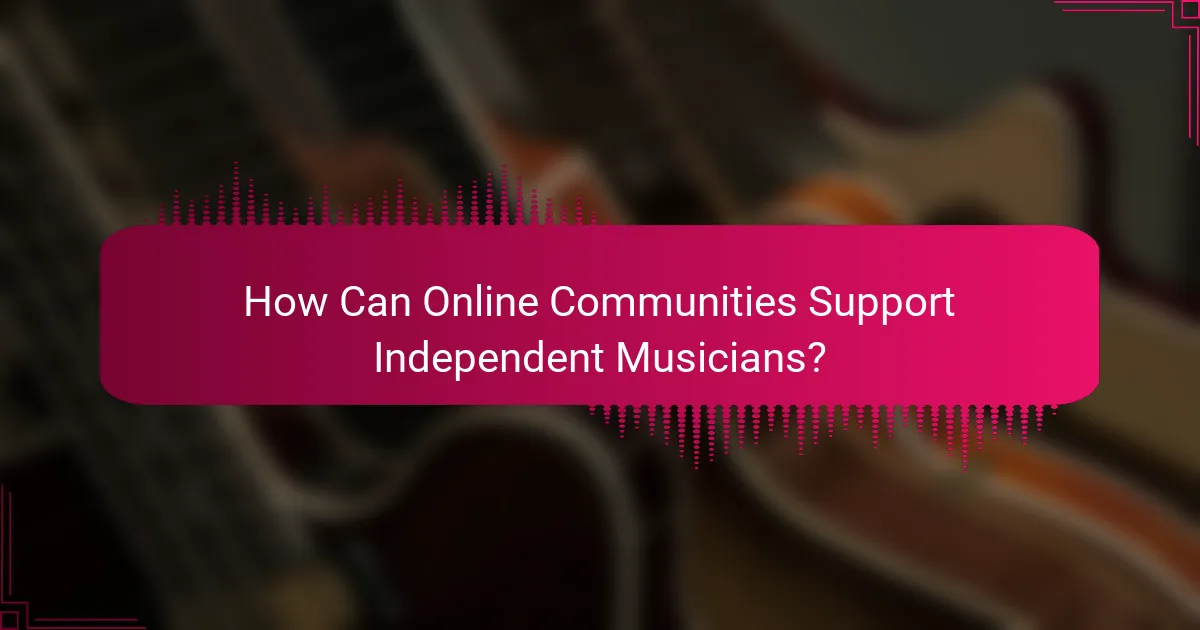
How Can Online Communities Support Independent Musicians?
Online communities can significantly support independent musicians by providing networking opportunities, collaboration platforms, and exposure. These communities facilitate connections with other artists, industry professionals, and potential fans, enhancing visibility and collaboration prospects.
Participating in online events such as virtual showcases or webinars allows musicians to showcase their work and gain feedback. Collaborating with fellow musicians through these platforms can lead to unique projects that blend diverse styles, enriching their artistic repertoire.
Online communities often provide resources such as forums for sharing experiences and advice, which can be invaluable for navigating the music industry. Engaging with these networks fosters a sense of belonging and can lead to rare opportunities for growth and development.
What Platforms are Most Popular for Music Networking?
Social media platforms like Instagram, TikTok, and Facebook are most popular for music networking. These platforms allow independent musicians to showcase their work, connect with fans, and collaborate with other artists. Instagram’s visual appeal helps in branding, while TikTok’s viral potential offers unique exposure. Facebook groups facilitate community building and event promotion. Engaging with these platforms can significantly enhance networking opportunities for musicians.
How do Social Media Strategies Impact Music Networking?
Social media strategies significantly enhance music networking for independent musicians. They facilitate connections through targeted outreach, collaboration opportunities, and community engagement.
Independent musicians can leverage social media to promote events, share music, and collaborate with other artists. Platforms like Instagram and TikTok allow musicians to showcase their work, attracting followers and potential collaborators. Engaging with online communities fosters relationships that can lead to live performances and joint projects.
Data shows that 70% of musicians find new opportunities through social media networking. This statistic highlights the importance of maintaining an active online presence. Regularly interacting with fans and fellow musicians can lead to a more robust network, increasing visibility and career opportunities.
In summary, effective social media strategies create pathways for independent musicians to connect with others, share their art, and grow their professional network.
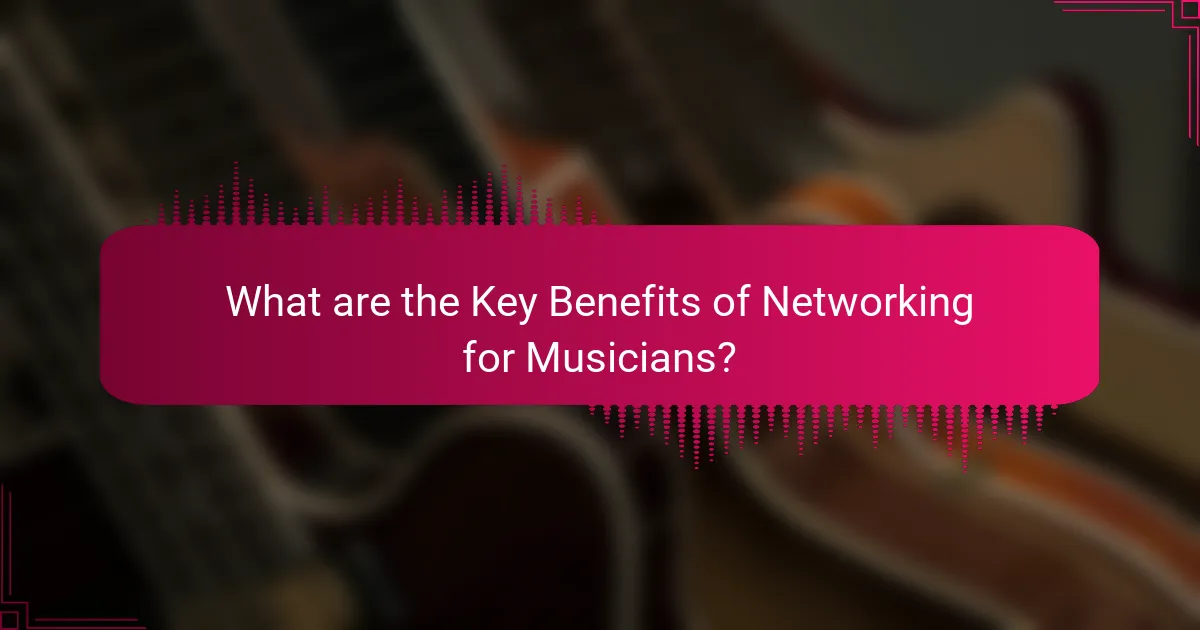
What are the Key Benefits of Networking for Musicians?
Networking offers musicians valuable opportunities to connect, collaborate, and grow their audience. By attending events, musicians can meet industry professionals and peers, leading to potential collaborations. Online communities provide platforms for sharing music, gaining feedback, and expanding reach. Collaborating with other artists enhances creativity and introduces musicians to new fan bases. These strategies collectively strengthen a musician’s presence and career in the competitive music industry.
How Does Networking Increase Performance Opportunities?
Networking increases performance opportunities by connecting independent musicians with industry professionals, peers, and fans. Engaging in events, collaborations, and online communities enhances visibility and access to new audiences.
Events provide platforms for live performances, fostering direct interactions with potential collaborators and fans. Collaborations with other artists can lead to innovative projects, expanding reach and introducing unique sounds. Online communities, such as social media groups or music forums, offer ongoing support and resources, allowing musicians to share experiences and opportunities.
Each networking strategy plays a vital role in building relationships that can lead to gigs, partnerships, and increased exposure in the music industry.
What Role Does Networking Play in Music Promotion?
Networking is crucial for music promotion as it opens opportunities for collaboration, exposure, and audience growth. Independent musicians can leverage events, partnerships, and online communities to build relationships and enhance their visibility.
Attending music events allows musicians to connect with industry professionals, other artists, and potential fans. Collaborations can lead to shared audiences and increased credibility. Online communities offer platforms for engagement and promotion, helping musicians reach wider audiences without geographical limitations.
Building a strong network can significantly impact a musician’s career trajectory. According to a study, 70% of musicians attribute their success to networking efforts. Engaging with others in the industry fosters support and can lead to valuable opportunities.
Overall, effective networking strategies are essential for independent musicians aiming to thrive in a competitive landscape.
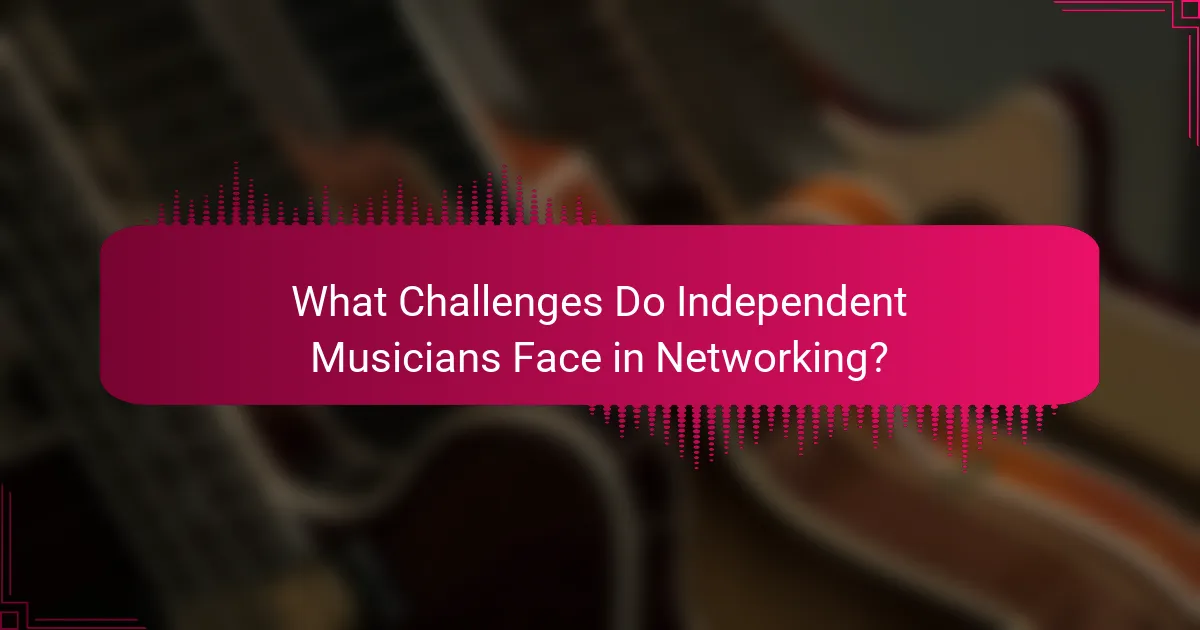
What Challenges Do Independent Musicians Face in Networking?
Independent musicians face significant challenges in networking, primarily due to limited resources and visibility. They often struggle to find relevant events that cater to their genre and audience. Collaborations can be difficult to initiate without established contacts, leading to missed opportunities. Online communities provide a platform, but competition for attention is fierce, making it hard to stand out. Additionally, the lack of industry knowledge can hinder effective networking strategies, limiting their ability to build meaningful relationships.
How Can Musicians Overcome Networking Anxiety?
Musicians can overcome networking anxiety by utilising targeted strategies that foster connection and collaboration. Attending local music events, joining online communities, and seeking collaborations with other artists can create supportive environments.
Independent musicians should focus on small gatherings to build confidence gradually. Engaging in online platforms, such as social media groups or forums, allows for low-pressure interactions. Additionally, collaborating on projects can enhance skills and build relationships organically.
Practising effective communication techniques, like active listening and open-ended questions, can ease anxiety. Setting realistic networking goals, such as meeting one new person at an event, can make the process manageable.
Lastly, embracing a mindset of mutual benefit can shift focus from anxiety to opportunity, as musicians recognise the value they bring to connections.
What Common Mistakes Should Musicians Avoid When Networking?
Musicians should avoid being overly self-promotional, neglecting relationship-building, and failing to follow up after initial meetings. Building genuine connections fosters collaboration opportunities. Additionally, overlooking online platforms can limit networking potential. Engaging authentically in both live and virtual spaces enhances visibility and support.
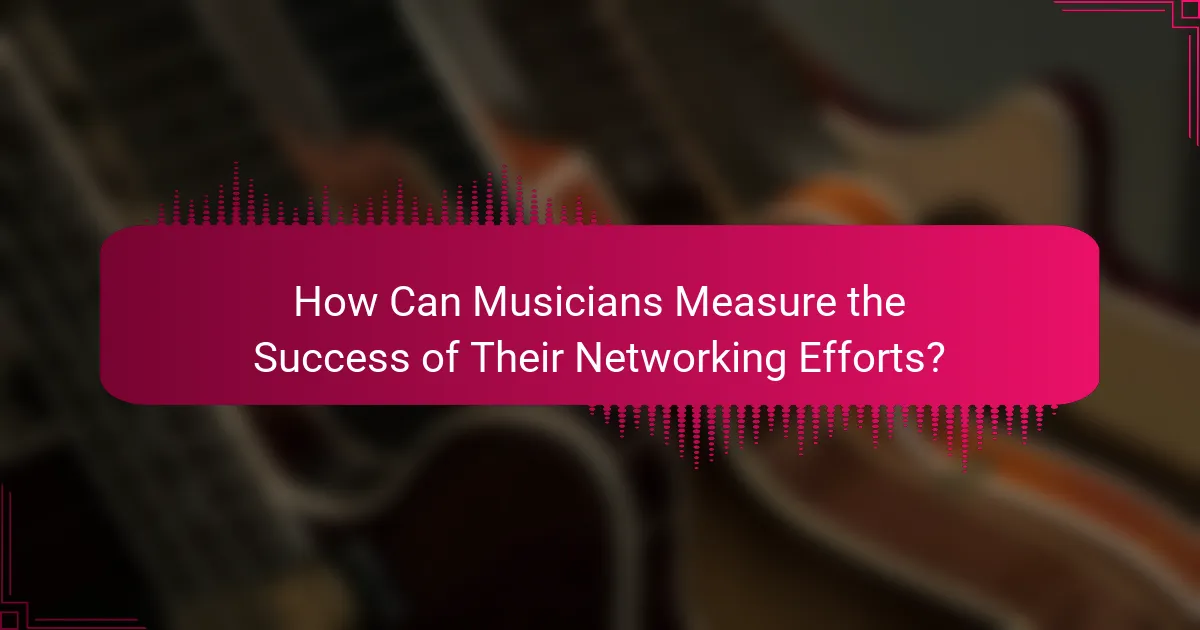
How Can Musicians Measure the Success of Their Networking Efforts?
Musicians can measure the success of their networking efforts through tangible metrics and qualitative feedback. Tracking the number of collaborations, social media engagement, and attendance at events provides clear indicators of growth.
Surveys and direct communication with peers can yield insights into perceived value and impact. Monitoring changes in audience size and fan interactions also reflects networking effectiveness.
Engagement in online communities can be assessed by the frequency of interactions and the quality of feedback received. These metrics, combined with personal reflections on opportunities gained, create a comprehensive view of networking success.
What Metrics Indicate Effective Networking?
Effective networking is indicated by metrics such as the number of meaningful connections made, engagement levels in collaborations, and participation rates in events. Tracking responses to outreach efforts and social media interactions further reveals networking success. Additionally, assessing the growth of online community involvement provides insight into the effectiveness of networking strategies.
How Can Feedback Improve Networking Strategies?
Feedback enhances networking strategies for independent musicians by providing insights into audience preferences and collaboration opportunities. Constructive criticism helps musicians refine their approach, leading to more effective engagement at events and within online communities. By actively seeking feedback, musicians can identify their strengths and areas for improvement, which fosters meaningful connections and collaborations. This iterative process ultimately builds a supportive network that can drive their careers forward.
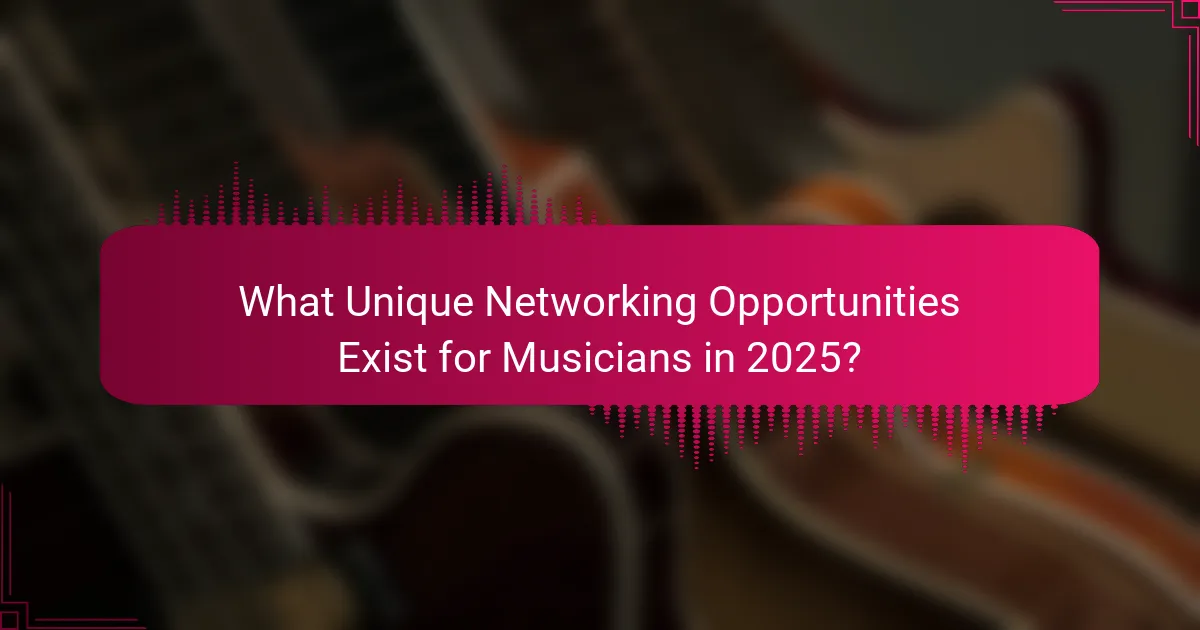
What Unique Networking Opportunities Exist for Musicians in 2025?
In 2025, independent musicians can explore unique networking opportunities through virtual festivals, collaborative songwriting platforms, and niche online communities. These strategies enhance visibility and foster connections.
Virtual festivals allow musicians to showcase their talent globally, attracting diverse audiences and industry professionals. Collaborative songwriting platforms facilitate partnerships, enabling artists to create new music across genres. Niche online communities provide targeted support and resources, connecting musicians with like-minded peers.
As a result, these networking avenues empower independent musicians to build relationships, share knowledge, and expand their reach in the evolving music landscape.
How Do Music Festivals Serve as Networking Platforms?
Music festivals serve as effective networking platforms for independent musicians by fostering connections, collaborations, and exposure. These events create opportunities for artists to meet industry professionals, other musicians, and potential fans.
Festivals often feature workshops and panels where musicians can learn from experts and share experiences. Collaborations may arise from casual interactions, leading to new projects and creative partnerships. Additionally, the diverse audience at festivals allows musicians to showcase their work, gaining visibility and building their brand.
Online communities formed around these festivals extend networking opportunities beyond the event itself. Musicians can engage with peers and fans, sharing insights and resources that enhance their careers. Overall, music festivals are vital for independent musicians seeking to expand their professional networks.
What Innovative Collaboration Models are Emerging in the Music Industry?
Innovative collaboration models in the music industry focus on networking strategies that empower independent musicians. Events, collaborations, and online communities facilitate connections, enhance visibility, and foster creativity.
Independent musicians increasingly engage in co-writing sessions to blend styles and reach new audiences. Virtual events have emerged as platforms for showcasing talent and networking. Online communities, such as social media groups, allow musicians to share resources and collaborate on projects, creating a supportive ecosystem.
As a result, these models help independent artists navigate the industry, improve their craft, and build sustainable careers.
What Best Practices Should Independent Musicians Follow for Successful Networking?
Independent musicians should actively engage in networking to build connections and enhance their careers. Attending music events, collaborating with other artists, and participating in online communities are effective strategies.
1. Attend local and national music events to meet industry professionals and fellow musicians.
2. Collaborate on projects to expand reach and share audiences, increasing visibility.
3. Join online communities and social media groups focused on music to share experiences and resources.
4. Utilise platforms like Bandcamp and SoundCloud for exposure and feedback from a wider audience.
